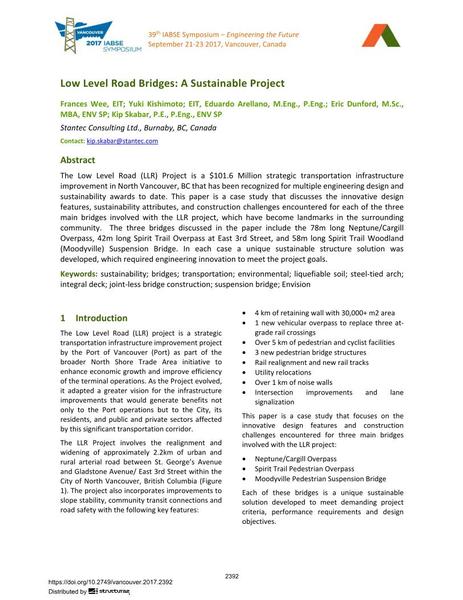Low Level Road Bridges: A Sustainable Project

|
|
|||||||||||
Bibliographic Details
| Author(s): |
Frances Wee
(Stantec Consulting Ltd., Burnaby, BC, Canada)
Yuki Kishimoto (Stantec Consulting Ltd., Burnaby, BC, Canada) Eduardo Arellano (Stantec Consulting Ltd., Burnaby, BC, Canada) Eric Dunford (Stantec Consulting Ltd., Burnaby, BC, Canada) Kip Skabar (Stantec Consulting Ltd., Burnaby, BC, Canada) |
||||
|---|---|---|---|---|---|
| Medium: | conference paper | ||||
| Language(s): | English | ||||
| Conference: | IABSE Symposium: Engineering the Future, Vancouver, Canada, 21-23 September 2017 | ||||
| Published in: | IABSE Symposium Vancouver 2017 | ||||
|
|||||
| Page(s): | 2392-2401 | ||||
| Total no. of pages: | 10 | ||||
| Year: | 2017 | ||||
| DOI: | 10.2749/vancouver.2017.2392 | ||||
| Abstract: |
The Low Level Road (LLR) Project is a $101.6 Million strategic transportation infrastructure improvement in North Vancouver, BC that has been recognized for multiple engineering design and sustainability awards to date. This paper is a case study that discusses the innovative design features, sustainability attributes, and construction challenges encountered for each of the three main bridges involved with the LLR project, which have become landmarks in the surrounding community. The three bridges discussed in the paper include the 78m long Neptune/Cargill Overpass, 42m long Spirit Trail Overpass at East 3rd Street, and 58m long Spirit Trail Woodland (Moodyville) Suspension Bridge. In each case a unique sustainable structure solution was developed, which required engineering innovation to meet the project goals. |
||||
| Keywords: |
bridges sustainability suspension bridge transportation environmental liquefiable soil steel-tied arch integral deck joint-less bridge construction Envision
|
||||

